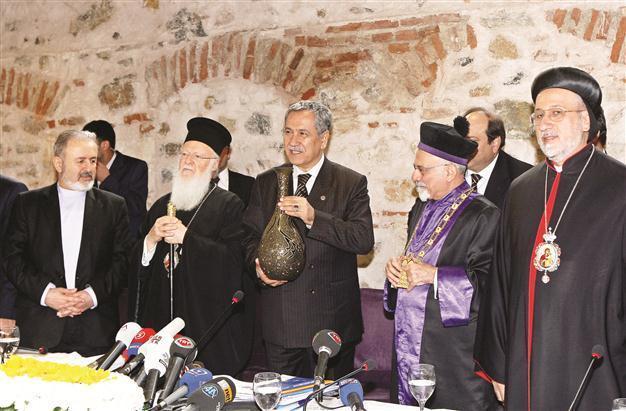Charter panel to invite minority spiritual leaders
ANKARA - Hürriyet Daily News

Greek Patriarch Bartholomew (2R), acting Armenian Patriarch Aram Ateşyan (L), Chief Rabbi İsak Haleva (2R) and the spiritual head of the Syriac Orthodox community Yusuf Çetin (R) are seen with Deputy PM Bülent Arınç in this file photo. AA photo
Parliament’s Constitution Conciliation Commission has decided to invite spiritual leaders of the Armenian, Greek Orthodox, Jewish and Syriac communities to hear their input for Turkey’s new constitution.If the three patriarchs and chief rabbi do not wish to appear at the panel, they will be asked to recommend appropriate non-Muslim
minority foundations whose representatives the commission should listen to.
“There are too many minority foundations, but we have little knowledge about them. That is why we decided to invite their highest-level representatives or to listen to those whom they would recommend,” Altan Tan, member of the commission’s related sub-panel, told the Hürriyet Daily News.
Greek Patriarch Bartholomew, acting Armenian Patriarch Episkopos Aram Ateşyan, Chief Rabbi İsak Haleva and the spiritual head of the Syriac Orthodox community Yusuf Çetin will be invited to avoid any controversy over whom the commission should select on behalf of the non-Muslim minorities. Over 200 minority foundations have been listed by the commission, including 162 established according to the 1923 Treaty of Lausanne.
At a meeting of the commission held Dec. 6 under Parliament Speaker Cemil Çiçek’s chairmanship, experts assisting the lawmakers said they had created a Twitter account to collect opinions from citizens and give deputies a chance to respond. The commission, however, rejected the idea on grounds that Parliament had already created a website for the same purpose and a Twitter account might water down the process.
Commission members also raised objections to the method the experts suggested to classify the input of proposals and demands that citizens, civic groups and public institutions would make. They decided the classification would be based on the sections of the current constitution.
















